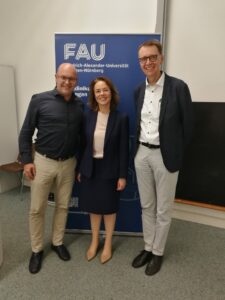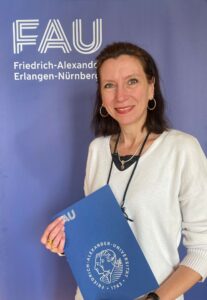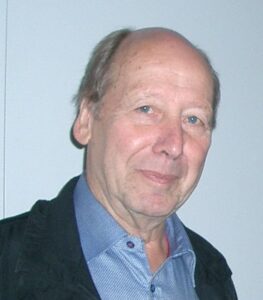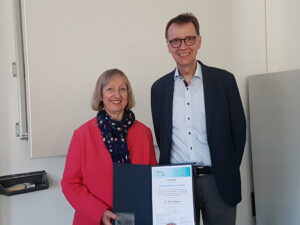2024
June 2024

© Christian Bogdan/Uniklinikum Erlangen
The FAU Profile Center Immunomedicine honors Prof. Dr. Carola Garcia de Vinuesa:
The Joachim Kalden Lecture 2024, which took place on June 11, 2024, was delivered by Prof. Dr. Carola Garcia de Vinuesa from The Francis Crick Institute, London, United Kingdom.
Carola Vinuesa has made major contribution to the field of follicular helper T cells (Tfh) and follicular regulatory T cells (Tfr). She is one of the discoverers of Bcl6 as master regulator of Tfh differentiation. She has also unravelled mechanisms by which these cells control antibody responses and limit autoimmunity. Her recent work links genetic variation in humans to autoimmune diseases such as lupus, shedding light on disease pathogenesis. For her achievements, Prof. Vinuesa has received numerous accolades, including the Alfred Gottschalk Medal of the Australian Academy of Science (2009), the Lupus Insight Prize (2023) and the Johann Anton Merck Award (2023). Since 2022, she has been a fellow of the Royal Society.
March 2024
Prof. Dr. Aline Bozec receives W3 professorship and is new Head of Research at the Department of Internal Medicine 3

“I am thrilled to announce that I have been promoted to the position of W3 Professor in Experimental Immune Therapy at Friedrich-Alexander-Univeristy Erlangen-Nürnberg by Prof. Joachim Hornegger. My time at FAU has been nothing short of remarkable, surrounded by exceptional colleagues and collaborators who continuously inspire me.
Furthermore, Prof. Georg Schett asked me to take the Head of Research at the Department of Internal Medicine 3 – Rheumatology and Immunology, Universitätsklinikum Erlangen. It fills me with great pride to play a more substantial role in the advancement of this exceptional clinic department, and I am eager to contribute further to its development.”
- Appointment of Prof. Dr. rer. nat. Thomas Gramberg as W2 Professor for Antiviral Innate Immunity
2023
Oktober 2023
- Appointment of Prof. Dr. med. Ricardo Grieshaber-Bouyer as Professor for Clinical Systems Immunology
August 2023
- 1st Meeting of the Executive Board of the re-structured FAU Profile Center Immunomedicine (FAU I-MED).
- Release of the new FAU I-MED homepage.
June 2023
- 1st International Symposium of the RTG2740 at the Institute of Clinical Microbiology, Immunology and Hygiene
- Prof. Dr. rer. nat. Hans-Georg Rammensee honored with the Joachim Kalden Lecture 2023:
The Joachim Kalden Lecture 2022, which took place on June, 2023, was delivered by Prof. Dr. rer. nat. Hans-Georg Rammensee, Department of Immunology, University of Tuebingen
April 2023
Resolution of the FAU leadership to convert the Medical Immunology Campus Erlangen, which has been an Interdisciplinary Center of FAU since 2009, into the FAU Profile Center Immunomedicine (FAU I-MED).
January 2023
Starting in January 2023, the guest seminar series of the Medical Immunology Campus Erlangen will routinely take place on Tuesdays at 12:30 pm. With this, we would like to enable all parents with children in need of care to also participitate in the seminar.
2022
November 2022
Obituary Prof. em. Dr. med. Martin Röllinghoff

Prof. Dr. med. Martin Röllinghoff, emeritus professor of the Medical Faculty and former director of the Institute of Clinical Microbiology, Immunology and Hygiene from 1983 until 2007, died on November 22 after a serious illness. Martin Röllinghoff was the founding father and driving force of infectious disease immunology in Erlangen and thereby strongly contributed to making immunology a central field of research at FAU.
While in the beginning his work focused on the defence mechanisms against Leishmania major parasites, later also bacteria (Yersinia enterocolitica, Salmonella enterica, Borrelia burgdorferi) and fungi (Candida albicans) became part of the institutional research portfolio through the recruitment of junior scientists. Likewise, the spectrum of immunological expertise at the institute continuously expanded to include not only T-cell immunology but also various components of the innate immune defence such as macrophages, dendritic cells and natural killer cells.
In 1990, together with his friend and companion Professor Joachim Kalden, Prof. Röllinghoff was co-founder of the Collaborative Research Centre 263 “Immunological Mechanisms in Infection, Inflammation and Autoimmunity”, in which he served as spokesperson from 1997 to 2002. He also founded and headed the Research Training Group 157 with the same name, which was funded by the DFG from 1990 until 1996.
The close interaction with Joachim Kalden led to the establishment of the Interdisciplinary Centre for Clinical Research (IZKF) at FAU and Erlangen University Hospital in 1996 as part of a highly competitive programme of the Federal Ministry of Research and Technology (BMBF). After the BMBF start-up funding expired, the IZKF Erlangen was transformed into an intramural research funding institution that still exists today and has contributed significantly to the national and international reputation of translational and clinical immunology in Erlangen.
Even after his retirement, Prof. Röllinghoff continued to offer his experience and knowledge in many ways, for example as a member of the Council of the University of Mainz and the University Council of Schleswig-Holstein or as member of the International Advisory Board of the Weill Cornell Medical College New York /Qatar.
We will deeply miss him at our guest seminars and remember him with great respect and gratitude.
July 2022
The Medical Immunology Campus Erlangen honors Dr. Anne O’Garra:

Joachim Kalden Lecture together with Prof. Christian
Bogdan (Spokesperson of FAU I-MED and Director of the Institute of Clinical Microbiology, Immunology and Hygiene, Universitätsklinikum Erlangen).
The Joachim Kalden Lecture 2022, which took place on July 5, 2022, was delivered by Dr. Anne O‘Garra, The Francis Crick Institute, London, United Kingdom.
Dr. Anne O’Garra’s main research interest focus on the regulation of the immune response during immune challenge and infection. In this context, her lab aims to identify immune cells, pathways and targets of protection and pathogenesis determining disease outcome in mice and men. Particularly, the group studies the regulation of cytokine-driven pathways in myeloid cells and T cells leading to or controlling pathology in various models of infection. A major focus lies on the investigation of cellular and gene expression changes at mucosal sites, specifically in (i) the lung and airways after infection with M. tuberculosis as well as (ii) in the gut and periphery after infection with H. hepaticus, T. gondii or E. coli.
